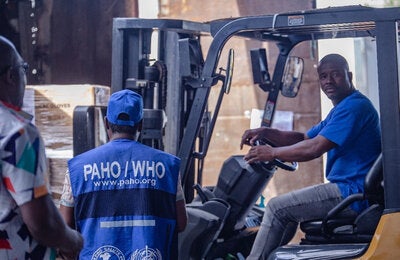Washington,D.C., 14 January 2013 (PAHO/WHO) — The 2009 H1N1 influenza pandemic, ongoing outbreaks of H5N1 influenza, and the growing burden of seasonal influenza epidemics have highlighted the need for countries around the world to have equitable access to flu vaccines. To advance toward this goal, the World Health Organization (WHO) developed a Global Action Plan for Influenza Vaccines that seeks to promote research and development, increase vaccine use, and improve production capacity for influenza vaccines.
This week, the Pan American Health Organization (PAHO), WHO's Regional Office for the Americas, is hosting a workshop on business modeling for sustainable influenza vaccine manufacturing. The Jan. 14-16 workshop brings together representatives of national immunization programs, regulatory authorities and vaccine makers from more than 28 WHO member countries.
The workshop is co-sponsored by WHO and the U.S. Department of Health and Human Services (HSS) to promote the creation of regionally-based, independent and sustainable vaccine production capacity in developing countries through capacity building and technology transfer. The workshop is the sixth of a series that began in 2010 as part of the Global Action Plan.
"During the influenza pandemic, it became clear that we face important challenges in supplying influenza vaccine in our countries and that we need to improve regional capacities for influenza vaccine manufacturing in order to satisfy regional needs in the event of another public health emergency," said PAHO Deputy Director Jon K. Andrus at the opening of the three-day meeting.
"The region of the America has a strong record in controlling and eradicating diseases though vaccination. We have learned by experience that these programs require appropriate policies from the ministries of health, functional national regulatory authorities that can guarantee the quality and safety of vaccines, strong manufacturing capacities to produce high-quality products, and, most of all, the trust of civil society," said Dr. Andrus.
The goals of the workshop are to increase the capacity of WHO member states to evaluate their investments in vaccine manufacturing to ensure sustainability and alignment with other national and regional priorities; to empower developing country manufacturers to develop sustainable business models to be able to meet their investment needs and countries' and regions' public health needs; and to promote the establishment of partnerships (public-private, public-public as well as private-private) among stakeholders in vaccine manufacturing.
"Increasing the use of influenza vaccine in all countries is critical to protect the world from this disease," said Dr. Marie-Paule Kieny, WHO Assistant Director General for Health Systems and Innovation. This also requires improvements in infrastructure and production capacity, she said.
Immunization against influenza is an essential public health intervention to control both seasonal and pandemic influenza outbreaks. Improving capacity for seasonal vaccine production also serves to strengthen capacity for pandemic vaccine production, improving national and global pandemic preparedness.
Pandemic response requires "guaranteeing universal and equitable access to influenza vaccines, which can only be achieved through concerted action at the glo0bal level, with the support of rational business models that lead to sustainable production," said Dr. Kieny.
Since its launch in 2006, the Global Action Plan for Influenza Vaccines has served as a catalyst for increased production of influenza vaccines, from 350 million doses in 2006 to over 900 million in 2009. As part of its efforts to guarantee more equitable access to pandemic vaccines, WHO has provided subsidies and/or licensing agreements to establish manufacturing capacity for influenza vaccines in Brazil, China, Egypt, India, Indonesia, Iran, Kazakhstan, Mexico, the Republic of Korea, Romania, Serbia, South Africa, Thailand and Viet Nam.
Specific topics covered in the workshop include the economic characteristics of vaccines and vaccination, business models and principles of sustainability, the complexity of the vaccine production system, attracting investments and generating revenue, the impact of technology and vaccine production methods on business opportunities and strategies. Other subjects include innovative models that strive to meet investment demands while addressing national and regional public health needs; the role of national regulatory authorities in vaccine commercialization, licensing and innovation; the role and impact of networks; and the role of national and regional planning for influenza pandemic preparedness.



